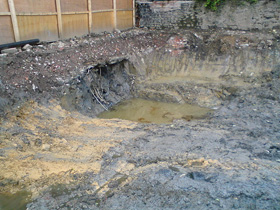Buying property is a major undertaking, especially for a business. If you are considering buying or leasing a property in the near future, it is of the utmost importance that you do the environmental due diligence in a timely manner, preferably early if possible. This is because it is common that sites are contaminated, and you want to be sure of what you are getting with your potential property. It is likely that if the property you are looking into has been developed in the past, then there is a risk of contamination. Contamination is even more common is downtown or industrial areas.
There are three common risks associated with buying or leasing contaminated property. These three risks are cleanup risk, damages risk, and business risk. This article will discuss these risks in further detail, as well as how to manage the contaminated property. This article is important to you if you are considering purchasing or developing a piece of property in the near future.

Image credit: Dumelow (Source: Wikipedia)
Cleanup Risk
Cleanup risk can be defined as the risk of liability to the government for the clean-up of the site. This includes the risk to natural resources, fines, and penalties. Even if you were not the cause of the contamination, you are responsible for the clean-up, as you are the one who purchased the property and the one who currently owns it. The clean-up costs, fines, and penalties can add up and become overwhelming in cost.
Damages Risk
Damages risk can be defined as the liability to your neighbors or nearby property owners when contamination reaches their property. This is common with contamination, as it will often travel with the groundwater to the nearby properties, causing them contamination as well. This can increase the property value for the owners and you will be responsible for the clean-up, not to mention the possibility of a lawsuit from a nearby owner.
Business Risk
Business risk can be defined as the risk of the buyer not being able to use or develop the property as he/she intended to, or being able to obtain financing for development, or to be able to resell the property later on. This can mean that the money spent on the property was wasted, and the property has the potential to end up as a bad investment.
While these risks should have potential buyers invested in the early detection of contamination on the potential property, buyers often leave environmental issues to the last minute or don’t think about them or bother checking the risks at all. This is a very big mistake. It is very important to hire an appropriate firm or individual to assess the property to understand any environmental concerns.
Managing the Risk
While the easiest way to avoid the risks is to simply not buy the property, this does not mean that a contaminated site should be automatically looked over and not bought. Sometimes the issue might be minimal and easily fixable, or the business deal might be so great that the environmental can be dealt with due to the deal you are getting. Here are some ways to manage the risks associated with contamination to your property.
Insurance, escrows, and indemnities are all ways to help manage the risk of contamination to your property. These things help insure that you are held at the least liability for costs and help to cover any costs you might incur as the result of contamination. Another way to help manage the risks is through a Brownsfield Agreement with DENR. This means that you will invest capital to develop the property, make it safe for use, and provide public benefit. In return, the state makes you the promise of liability protection and will not require additional clean-up beyond what the original agreement requires. Check out Environmental Data Resources for more information regarding contamination and it’s risks
